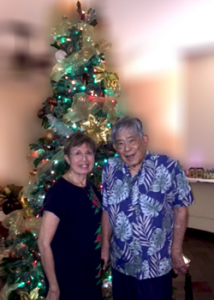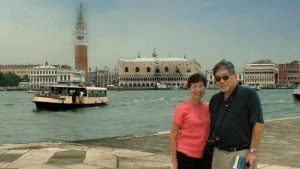
Ninety-one year old Thomas Mui will finally complete his master’s degree in political science at the University of Hawaiʻi at Mānoa this fall, more than 70 years after first starting his graduate studies.
Mui, who will turn 92 in April, originally completed his coursework for a government degree, now called political science, in the mid-1950s but never finished the then-required thesis. Instead, he went on to earn a law degree from Fordham University in New York and spent 60 years practicing law in Hawaiʻi.

UH Mānoa’s Department of Political Science and Graduate Division worked together to create a unique pathway for Mui to complete his degree. Rather than a traditional thesis, Mui provided a report about his academic experiences and the university’s government program in the 1950s.
Mui said that he was inspired to finish his degree after 105-year-old Virginia “Ginger” Hislop received her graduate degree from Stanford earlier this year.
“You’re never too old to get a degree,” Mui said with a smile. “It has meant a lot because this is the accumulation of work that was done.”
Mui’s interest in government and politics began at a young age. His father was consul general for the Republic of China in Hawaiʻi from 1932 to 1946, before he was appointed as Ambassador to Cuba. Mui attended school in Cuba and the East Coast to be closer to his family.
Experience at UH in the 1950s

Mui arrived as a student in 1950, just as the Korean War broke out, and was part of the university’s ROTC program. The campus was dramatically different then—a collection of neoclassical buildings near what was once a pig farm, with temporary structures and veteran housing scattered across the grounds. He recalls playing Canasta in Hemenway Hall instead of studying.
The university was experiencing rapid transformation during this time. The campus was expanding, with new buildings and programs emerging, including Saunders Hall, named after Allan Saunders, one of Mui’s professors and a prominent local civil rights advocate.
“UH has meant a lot because it was sort of the launching pad for everything else,” Mui said. “And when I got the launching pad, after that, I gained a lot of experience.”
Mui’s academic journey intersected with significant moments in Hawaiʻi’s political history. During his time at UH, he worked closely with Spark Matsunaga, who later became a U.S. senator, and was involved in local political campaigns. After completing his law degree, Mui worked as a deputy public prosecutor, practiced private law and served as an administrative assistant to Matsunaga. He was also personally sworn into practice by U.S. Supreme Court Chief Justice Earl Warren and met President John F. Kennedy.
Mui’s degree completion represents more than an academic milestone. It symbolizes a lifelong commitment to learning and public service that has spanned decades of political and social transformation in Hawaiʻi, and highlights the university’s flexibility and commitment to recognizing long-term academic pursuits. Mui completed the remaining credits this fall, finally earning the master’s degree he began pursuing nearly 70 years ago—a testament to the enduring value of education and personal determination.
“Some students have asked me about (tips for success) and I said, ‘can you tell me what trends there are? What is Pascal? Who was Jimmy Stewart? Who was Doris Day?’ Because these were the buzzwords back in 1954, 1955,” Mui said. “Today I assume the buzzwords are Taylor Swift, Tom Cruise, C++, Java. Decades from now, how many of the brand new students are going to know who Taylor Swift is? So the only thing you can gain in using your UH degree is experience, and that is the most important thing, experience. The other advice I give people is: the only thing you have is time. Don’t waste it.”
—By Marc Arakaki

